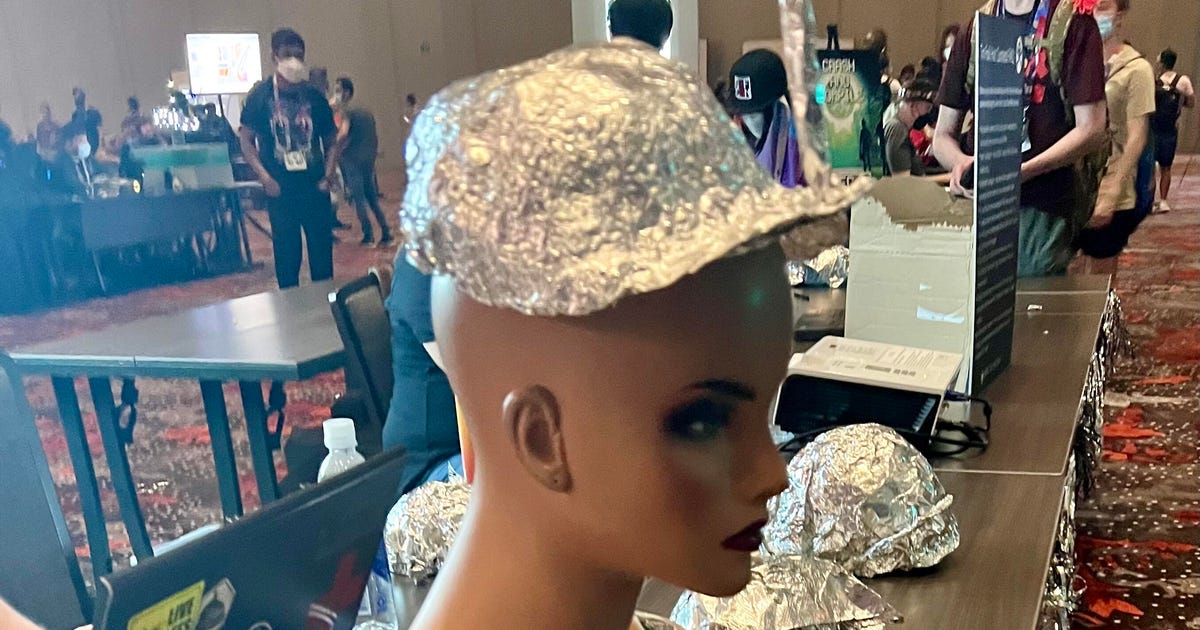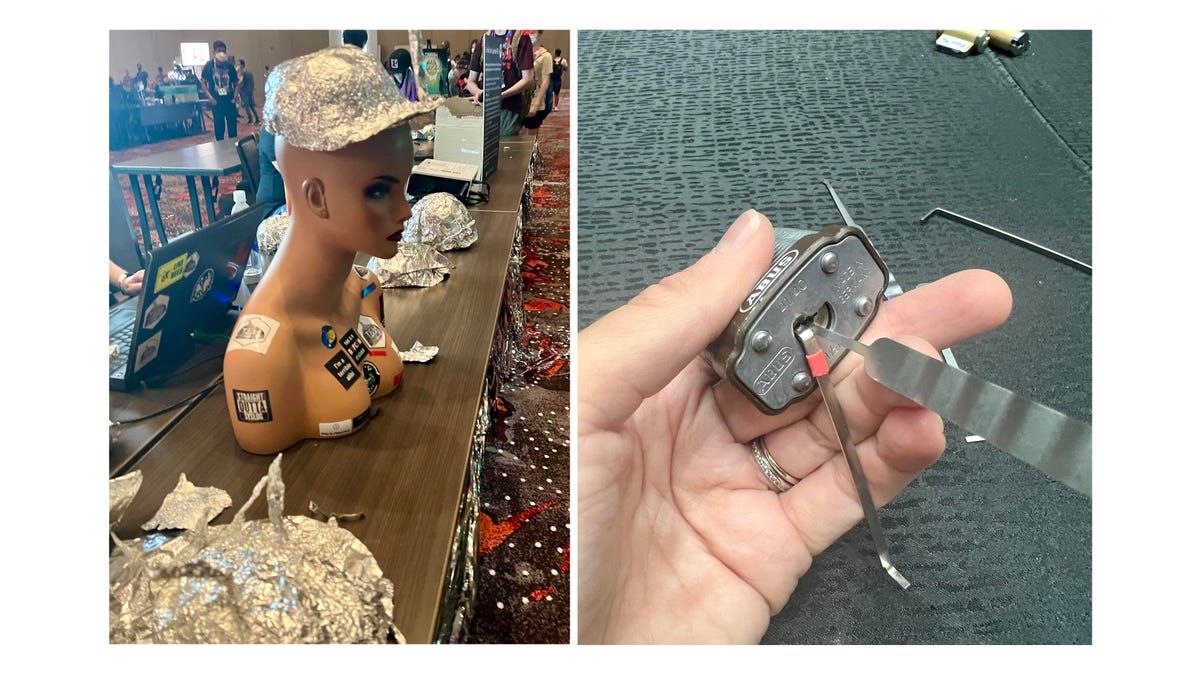Mount holyoke college what it s really like what it s really like being in a band mount holyoke college what it s really like what it s really like to live life golden song what it s really like on your period what it s really like to work at disney for what it s worth stevie nicks then you really might know what it s like what it s like lyrics what it takes lyrics

What It's Really Like at 'Hacker Summer Camp'
One moment, security experts are expressing concerns about cyberattacks stemming from either Russia's continued war against Ukraine or a military conflict between China and Taiwan. The next, Elijah Woods -- yes, Frodo from Lord of the Rings -- is spinning tunes at a party in Allegiant Stadium in Las Vegas.
Welcome to the Black Hat and Defcon computer hacking conferences or, as the industry calls them, "hacker summer camp."
The annual events, which happen back to back, bring tens of thousands of cybersecurity professionals and other colorful characters to the Vegas strip each year to hear about the latest in cybersecurity tech, as well as what creative ways people are using to try to break it.
At this year's events, which took place earlier this month, geopolitics cast a wide shadow -- from the war in Ukraine to the upcoming midterm elections -- illustrating just how pervasive cyberattacks have become in our lives.
At the more business-focused Black Hat, Chris Krebs, former director of the US Cybersecurity and Infrastructure Security Agency, specifically urged companies to start looking at how they could be affected if China invades Taiwan.
Later in the week, misinformation and election security were big topics of discussion at Defcon, known for drawing a more eclectic collection of young professionals, as was the right to hack and repair tough-to-fix medical equipment like motorized wheelchairs.
What makes these conferences unique is the mix of buttoned up security talk and the kind of activities you'd expect to see from a group of hackers. Crowds packed Defcon's Social Engineering Community Village to watch teams use their best "vishing" skills to try to get companies to hand over potentially sensitive information, proving that you don't need computer skills to be a great hacker.
Defcon contests to build the best signal-blocking tin foil hat or construct the fastest contraption for cooling a beer down from 100 degrees drew countless entries. Meanwhile, the "Wall of Sheep" listed the devices of those who didn't do enough to secure them and there was rarely an empty seat at its always popular lock-picking village.

Defcon's competition to build the best signal-blocking tin foil hat combined the best in function and fashion, while this year's lock-picking village was as busy as ever.
Bree Fowler/CNETIt was, as Defcon's organizers billed it, a "hacker homecoming." COVID canceled both events in 2020 and severely shrunk them in 2021. This year, in-person Black Hat attendance totaled 17,400, down from its pre-COVID 2019 total of 20,000. About 25,000 people went to Defcon, putting 2022 on the low end of its average of 25,000 to 28,000 people in recent pre-COVID years.
This year's attendees appeared to be making the most of the experience. Talks were packed and so were the parties. In particular, Defcon's crowds managed to overwhelm the nearby hotels and casinos. Just getting a morning coffee involved an hour wait.
There was the usual crop of company-sponsored Black Hat receptions including one where Wood DJed at the new home of the Las Vegas Raiders while attendees indulged in prime rib and truffled mashed potatoes at a party thrown by Noname Security. As usual, Defcon's trademark pool, hotel and other parties stretched into the wee hours of the morning and probably made more than a few people miss their morning meetings.
All of that took place despite the Biblical-level storms and flooding that pummelled Las Vegas throughout the week, turning its streets into rivers, swamping some of its famous casinos and leaving the city feeling bizarrely muggy.
That said, the mood at Defcon seemed a bit more mellow and weirdly, more well behaved, than in years past. Maybe it was COVID worries or a lack of party funding stemming from the drop in crypto. Maybe people just returned after a multi-year hiatus and realized that they're just not as young as they used to be.
Oddly, one of the most fun gatherings took place at sunrise, rather than after dark.
For the four days of Defcon, a group of brave and very sleepy souls took to the Las Vegas Strip at 6 a.m., sidestepping giant puddles, broken glass and passed-out partiers to run a 5K together. On the final day of Defcon, they were some of the happiest people in Vegas.
You could argue that's fitting. The week of Black Hat and Defcon can often feel like an epic road race. It's both exciting and exhausting. And when it's finally over, you're happy to go home but already looking forward to next year's event.
Source
Blog Archive
-
▼
2022
(240)
-
▼
October
(83)
- Best E Ink Tablets For 2022: Note-Taking Solutions...
- Vizio M-Elevate Soundbar Review: Great Sound, Elev...
- Bridgerton Was The Biggest Thing On Netflix Last W...
- Apple Watch SE Sale: Save $60 Ahead Of Cyber Monday
- Rev Up For A Live-Action Hot Wheels Movie From J.J...
- Samsung Summer Sale: Up To $800 Off Appliances And...
- Paramount Plus, Showtime Now Available In A Single...
- Lenovo Staff Loses Company-issued Laptop... And Co...
- Who Is WhatsApp Co-founder And CEO Jan Koum?
- 2022 Honda Pilot Sport Becomes New Base Trim, Resu...
- Uber Will Rent Teslas To Its Drivers Through New H...
- Oppo Find X5 Pro: Five Reasons This Flagship Andro...
- Facebook Is Shutting Down Its Facial Recognition S...
- All The Google Docs Features From My Wish List Tha...
- Netflix Rejigging Squid Game To Cut Phone Number A...
- Best Mattresses For Kids In 2022
- Pixel 6 Pro Review: Google's Flagship Is Still A T...
- High-end Drip Coffee Makers That Take Brewing Seri...
- Canva: The Poster Child Of DIY Graphic Design
- Halloween PlayStation, Xbox And Switch Game Sale
- How To Stream Netflix's Epic Kanye West Doc Today,...
- Facebook's Global Head Of Safety Hasn't Fully Read...
- Hindsight Asks Players To Confront Loss, Grief And...
- Xiaomi Redmi Note 5 Is An Android Phone For The Ma...
- 'All The Old Knives' Review: Lacklustre Chris Pine...
- Google Updates In-App Billing Rules To Allow Rival...
- Best Wi-Fi 6 Routers Of 2022
- Pac-Man Live-Action Film In Development
- The Trick To Getting A Gym Membership For Practica...
- Microsoft Store On Windows To Allow Third-party St...
- 'Nope' Isn't Streaming Yet, Sorry (but Here's When...
- Ring Alarm Pro Review: A Giant Leap For Home Security
- Remember Chumby? Cute Touchscreen Gadget Returns F...
- Streaming Means You'll Never Own Your Favorite Mov...
- Best Drones For 2022
- IPadOS: 5 Best New Security And Privacy Features F...
- Acer Reveals Chromebooks, Eco-friendly Laptops, Ga...
- 2023 Kia Sportage Hybrid Review: Grow Up, Glow Up
- Forget The Galaxy S22 And Get An S21: Main Differe...
- 9 Great Reads From CNET This Week: PS5, Apple Watc...
- The Trick To Finding Free Wi-Fi Anywhere In The World
- How To Turn An IPad Into A Second Display For Your...
- Halloween 2019: Last-minute Costumes You Can Get O...
- Robinhood Starts Rolling Out Beta Version Of Crypt...
- WhatsApp Is The World's Most Popular Messaging App...
- 2022 Kia Carnival First Drive Review: A Luxurious ...
- NASA And SpaceX Prep Halloween Launch For Crew-3 T...
- $55,000 Honda Civic Si FE1 Is An Accessible Turnke...
- Forest Bathing: The Free Cure For Stress And Anxiety?
- How To Get Your New Backyard Ready For Hosting
- Get The Motorola One 5G Ace For $30 When You Sign ...
- Best USB-C Monitor Deals: Get A 24-Inch FHD Displa...
- Ransomware Cost US Schools $3.56 Billion In 2021, ...
- DJI Osmo Mobile 2 Will Be The Phone Camera Stabili...
- AMD Previews CPUs For Cheap Laptops, Flagship Gami...
- Instant Pot's Vortex Plus Proves 2019 Really Is Th...
- Don't Have AC? Try Putting Your Socks In The Freezer
- 2022 Bentley Flying Spur Hybrid Review: Your Milea...
- Xiaomi Mi Mix 3: Release Date, Price, Specs, Four ...
- Hailee Steinfeld Finally Confirms She's In The New...
- $10,000 Or $50,000 Student Loan Forgiveness: Could...
- New Gadget Warns You When You Smell Bad
- What It's Really Like At 'Hacker Summer Camp'
- When Local Newspapers Fold, Polarization Rises. He...
- Xiaomi Redmi 3 Review: Xiaomi's Redmi 3 Is Pretty ...
- Unplug These Appliances To Save $100 Each Year
- Apple's IOS 15.2 Update: How To Download, New Feat...
- World's Oldest Living Dog Is A Toy Fox Terrier Tha...
- SpaceX's Starlink Satellite Broadband Is Coming To...
- LG's Star Wars C2 OLED TV Goes On Sale
- How To Fix Netflix Error Code M7111-5059 If You Ha...
- The Best Sci-Fi Movies On Netflix You Absolutely N...
- A Gadget To Test For Food Allergies? Not A Piece O...
- Pokemon Sword And Shield Players Can Get A Shiny G...
- San Diego Comic-Con 2022 Highlights: New Avengers ...
- How To Adjust To The End Of Daylight Saving Time
- 'House Of The Dragon' Small Council: What Do Those...
- Deleting Your Twitter? Here's How To Archive Your ...
- Windows 11 Review: Microsoft's Subtle Changes Make...
- 2022 Honda Civic Sedan, Hatchback Designs Show Up ...
- WWE WrestleMania 38 Sunday Results: Reigns Wins, F...
- I Bonds Fight Inflation With A 9.62% Return: How L...
- Rhythm Action Game Thumper: Pocket Edition Now Ava...
-
▼
October
(83)
Total Pageviews
Search This Blog
Popular Posts
-
Cartao de credito de tester, gerador de cartao de credito de portugal, santander cartao de credito desbloquear, cartao de credito de alumini...
-
Ukuran name tag yoyo stroller, ukuran name tag yo yo tricks, ukuran name tag yoyo games, ukuran name tag yoyo loach, ukuran name tag yoyo bu...
-
Contoh soalan kbat bab 2 sejarah tingkatan 5 malayan, contoh soalan kbat bab 2 sejarah tingkatan 5 bab8, contoh soalan kbat bab 2 sejarah ti...

